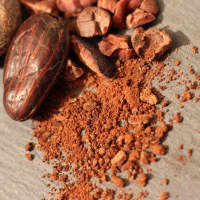Cacao
Healing Properties
Antioxidant
Skin Health
Circulation
Dietary flavanols from cocoa contribute to improved dermal blood circulation.[1]
Hydration
Dietary flavanols from cocoa positively affect cosmetically relevant skin surface and hydration variables.[1:1]
Photoprotective
Dietary flavanols from cocoa contribute to endogenous photoprotection.[1:2]
UV Protection
Cacao is photoprotective against UV-induced erythema.[1:3]
Brain Health
Promotes cognitive health.
- Regulates Neural Signaling & Sensory Perception.
Endocrine System
Health benefits related to the endocrine system.
Heart Health
Immune System
Regulates Cellular Immune Response
- Cacao consumption up-regulates multiple intracellular signaling pathways involved in T cell activation and cellular immune response.[2]
- Effects are noticeable within 2 hours. Greater gene expression is observed by the end of 1 week intervention.[2:1]
- Cacao components inhibit MAPK activation
- T cell function is preserved and enhanced
Disease / Symptom Treatment
Study Type: Preprint: Review Paper
Title: An extensive Review of Sunscreen and Suntan Preparations
Author(s): AK Mohiuddin
Institution(s): Department of Pharmacy, World University of Bangladesh; 151/8, Green Road, Dhanmondi, Dhaka –1205, Bangladesh
Publication: Preprint
Date: April 2019
Abstract: The sunscreen industry is achieving remarkable worldwide prominence by responding to the growing need for skin protection with fast-paced innovation. Increased consumer awareness of the harmful effects of sunlight has fueled the demand for improved photo protection. The need for broad-spectrum protection from both UVA and UVB rays has inspired scientists worldwide to research new cosmetic formulations and delivery systems. More effective sunscreen actives, emollients and novel cosmetic and functional ingredients have been regularly added to the formulator’s repertoire. Creativity in innovation has been hindered only by regulatory agencies and patent restrictions worldwide. Familiarity with the current restrictive regulations and patent law infringements has become integral to any research effort attempting to provide improved protection to individuals affected by the sun’s damaging effects. The increasing incidence of skin cancers and photo damaging effects caused by ultraviolet radiation has increased the use of sun screening agents, which have shown beneficial effects in reducing the symptoms and reoccurrence of these problems. Unlike the situation in Europe where sunscreen ingredients are considered under cosmetics guidelines, the FDA is required to define sunscreens as drugs since they are advertised to prevent sunburn and, more recently, the risk of skin cancer. In the USA, the FDA has been regulating this industry since August 25, 1978, with the publication of the Advance Notice of Proposed Rulemaking. Sunscreens are considered drugs and cosmetics and therefore must be governed by the FDA-OTC monograph. With the variety of sunscreen agents used in cosmetic and UV protection products, Australia, Canada, and the European Union (EU) have also developed regulatory protocols on safe sunscreen product use. Unlike the USA though, Australia has approved 34 active sunscreen ingredients and the EU has approved 28 of these ingredients. Current FDA regulations allow labeling of sunscreen products to a maximum of 30þ, despite the many products currently available with numbers as high as 100. From a cosmetic formulation point of view, increasing the SPF number in a product is governed by simple chemical principles.
Link: Source
Citations: ↩︎ ↩︎ ↩︎ ↩︎Title: Dark chocolate (70% cacao) effects human gene expression: Cacao regulates cellular immune response, neural signaling, and sensory perception
Author(s): Lee Berk, Kristin Bruhjell, Warren Peters, Peter Bastian, Evertt Lohman, Gurinder Bains, Jesusa Arevalo, and Steve Cole
Institution(s): Center for Health Promotion, Loma Linda University, Loma Linda, CA, Loma Linda University, Loma LInda, CA, Medicine and Psychiatry and Bio-behavioral Sciences, UCLA School of Medicine, Los Angeles, CA
Publication: The Federation of American Societies for Experimental Biology
Date: 20 Apr 2018
Abstract: Dark chocolate (70% Cacao) is a major source of flavonoid antioxidants, which appear to support cognitive, endocrine, and cardiovascular health benefits. However, the in vivo effects of cacao on human genome function are unknown. In a pilot feasibility experimental trial, we examined the effects acute and chronic cacao consumption on human gene expression in circulating blood cells.
Link: https://www.fasebj.org/doi/abs/10.1096/fasebj.2018.32.1_supplement.755.1
Citations: ↩︎ ↩︎
